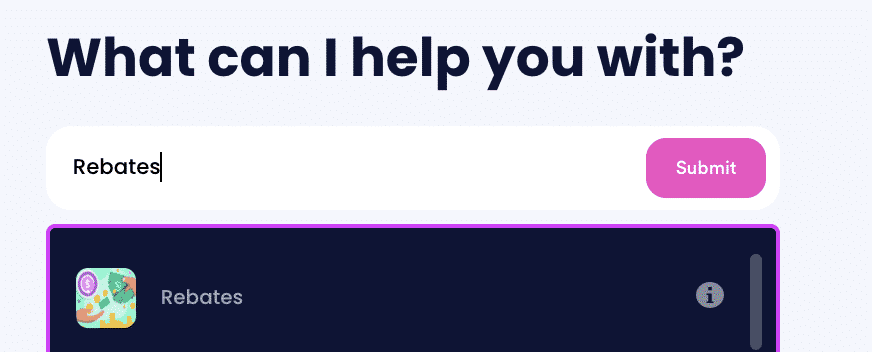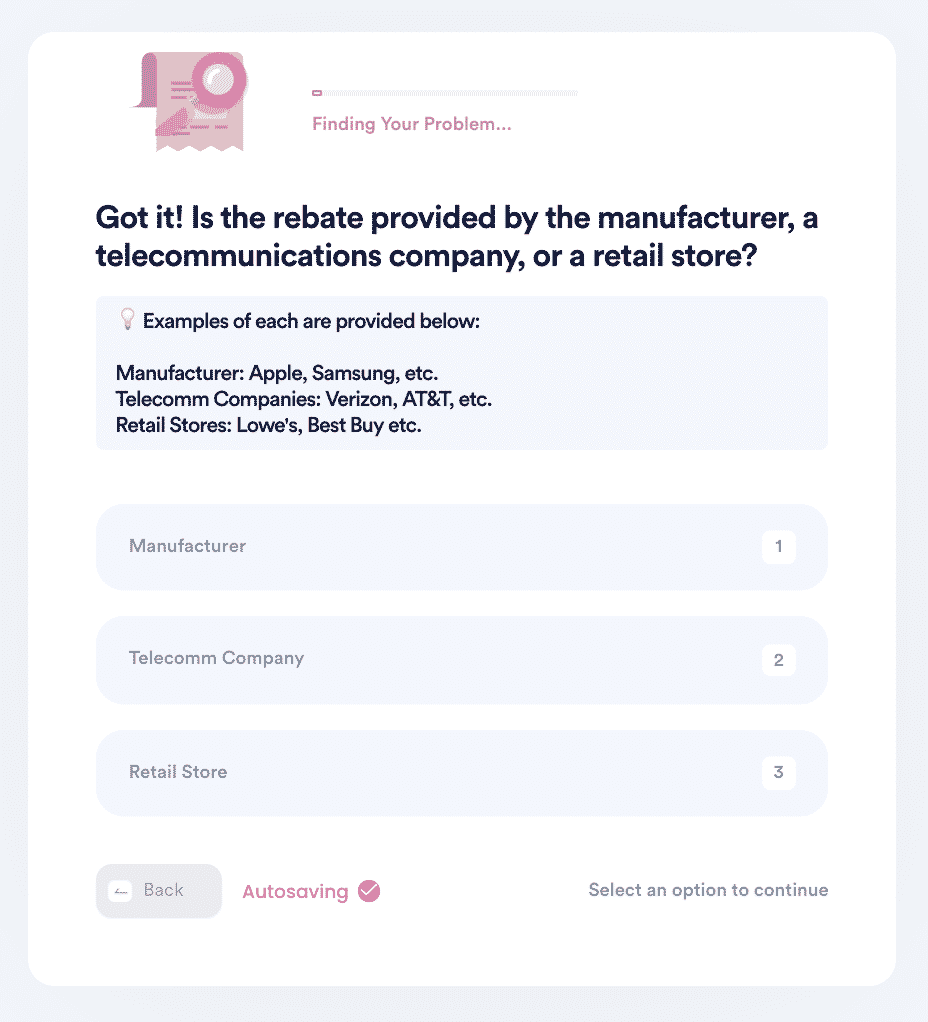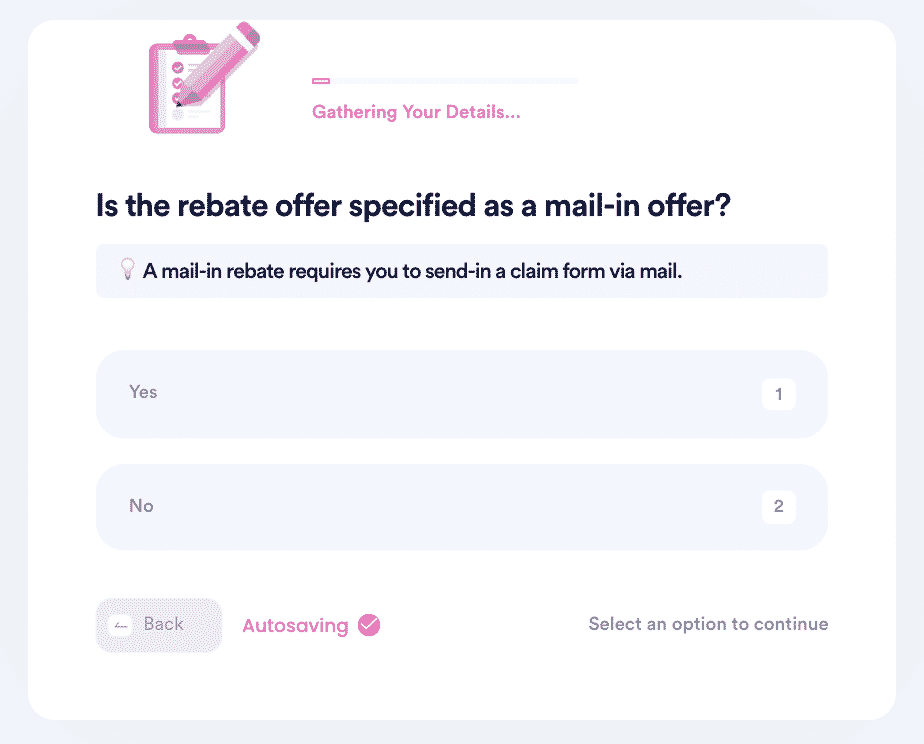Are Rebates Taxable?
Manufacturers and retailers embrace rebates as a method of boosting sales and building their brand against the competition. It is viewed as an easy way to get brand ambassadors without paying high salaries for it. But are these ?
A rebate is not subject to tax; it is considered a reduction of the item's price and works in the same way as a direct discount. However, if the reward is offered as a gift for taking specific actions like opening a bank account, it's considered income and, therefore, taxable.
The tax bite on rebates can be pretty big (about 25%), which can be frustrating to participants. However, whether the rebates are taxable or not, DoNotPay can help you claim them from your favorite company.
What Is a Rebate?
A rebate is an incentive to a customer who has made a full payment on a product. It's like a discount at the time of purchase or sent back to the customer after completing a purchase.
An example of a rebate is an electrical appliance store that offers a $30 cashback on a $300 microwave. After the purchase, the customer is expected to main in a rebate application form with details of the purchase. The company will review the application and award a rebate accordingly.
In most cases, companies or retailers set eligibility criteria for the customer or the product in order to target a particular group of people or drive sales to a specific product.
There are several types of rebates.
| Instant rebate | This is a marketing approach wherein a product is offered at a discounted price applied at the point of purchase. Instant rebates are handled upon purchase, so the refund is available immediately. |
| Mail-in rebate | The most frequent type of rebate is a mail-in rebate, which differs from quick refunds in that it requires you to take action for the refund to be processed. You must give any information necessary for the rebate, which often consists of your phone number, name, address, and a receipt. When it comes to mail-in refunds, there is a deadline by which the rebate has to be sent or received. This deadline is usually 30 days after the purchase, and reimbursement is generally issued within 12 weeks. |
| Product mix incentive | Suppliers may offer a refund based on total spending overtime to entice buying groups and distributors to buy various items. This type of rebate is used to sway buyers away from other suppliers for other product lines where buyers generally purchase only a few products. |
| Central distribution center rebate | Some suppliers prefer to distribute to a centralized distribution center to save money on logistics. They leave the buyer with the cost and responsibility of distributing their CDCs' products to their branches and buyers. So this will save you some money if you choose to distribute it for the company. |
| Growth incentive | A rebate based on incremental order growth is frequently used when a supplier wants to increase overall volume rather than just personal order volume.
This might be in the manner of a year-over-year goal, with a supplier rebate if the volume purchased surpasses the growth baseline. This can be problematic for purchasing groups or multi-branch operations, as it can be difficult to aggregate total expenditure by product line from the prior year. |
When Is a Rebate Taxable?
As mentioned earlier, the where the retailer or manufacturer reduces the price of an item to reward their customers. Therefore, such rebates are not taxable.
On the other hand, some rewards may attract taxes depending on who gave them. For example, airline miles may be subject to taxes when redeeming them. The tax is calculated with the day's value of one mile.
In the case of health insurance rebates, there are different scenarios for when the and when they are not. These include:
- If no itemized deduction was claimed for the premiums, the rebate is not taxable.
- If an itemized deduction was claimed for the premiums, the rebate to the extent the deduction produced a tax benefit.
- If a self-employed person deducted the premiums as an adjustment to gross income (i.e., as an "above-the-line deduction"), then the entire rebate is taxable.
How to Submit Claims for Rebates by Yourself
If your favorite brand is offering rebates on specific products, you can save more by claiming these rebates. Here's how to go about it.
- Check for the eligible products (most companies provide a catalog of qualifying products).
- Confirm your eligibility depending on the company's eligibility criteria.
- If you fit in the eligible category, purchase the products and pay fully for them. Ensure that you keep the receipts safe, as you'll need them to apply for rebates.
- Depending on the company's rebate application procedure, you can mail in the application form or submit it online in a rebate application portal.
- Upload or attach copies of the required documentation like the receipt or invoice.
- Wait for a few weeks for the company to consider your application and mail you a rebate check with your qualifying amount.
Most companies offer rebates on a first-come, first-served basis, so you'd want to apply for the rebates as soon as possible. Once approved, you can get a check in your mail within six to eight weeks. The rebate amount largely depends on the company and the products.
In case you are unable to apply for rebates by yourself, most companies offer alternatives like applying in person at the company offices or contacting customer support for guidance.
How to Claim Rebates With the Help of DoNotPay
DoNotPay can help you apply for rebates in different companies. Once you contact DoNotPay, you'll only need to submit details of the purchase and other documentation like receipts and let DoNotPay apply for rebates on your behalf.
Here is how it works.
- Search rebates on DoNotPay and select the type of rebates offer you want to claim (is it for a car, electronic gadget, household appliance, etc).

- Tell us more about the purchase, including the product name, brand, serial number (if relevant), and whether you bought it online or in-person.

- Select whether the rebate is online or mail-in. Upload your evidence documents, including receipts, and any necessary forms, and confirm your contact information.

And that's it. DoNotPay will file your rebate claim on your behalf by mail or online, depending on the rebate campaign. You should receive your rebate by check within 30 days.
What Else Can DoNotPay Do?
Is your favorite company offering rebates, and you are not sure how to claim them? DoNotPay works across the board and can help you claim rebates from all your favorite companies in a fast and easy way. Some of the companies DoNotPay can contact on your behalf include
- Menards Rebate
- Home Depot Rebates
- Goodyear Tire Rebates
- Michelin Tire Rebates
- Mass Save Rebates
- New Car Rebates
- Macy's Rebates
- Verizon Rebate Center
Also, you can learn what a rebate is and everything else about rebates. Check out DoNotPay's Claim My Rebate product page for more information.
 By
By